#america's water crisis
Explore tagged Tumblr posts
Text


#free palestine#gaza#palestine#free gaza#from the river to the sea palestine will be free#pray for palestine#🍉#contaminated water#clean water#water#humanitarian crisis#gaza strip#disease#diseases#israel#israel is committing genocide#genocide#ceasefire#permanent ceasefire#america#usa
4K notes
·
View notes
Text


#flint michigan#flint water crisis#america is a failed state#demexit#wtf is this bullshit#black misleadership class
7 notes
·
View notes
Text
I need Americans to stop weighing in on the UKs indoor vs outdoor cat debate until they read up on our biodiversity crisis and learn exactly why our wildlife decline is so serious (spoiler: it's not the cats)
#im all for advocating for indoor cats but americans please listen to us when we tell you its not what will save our wildlife. please#except in scotland with scottish wildcats. if youre gonna go hard on us for indoor cats focus on that. please#the UKs situation is entirely different to america and wont listen when we tell them this but they love to talk as if we're stupid#hold our government accountable. hold our landowners accountable. please#13% woodland cover left in the uk and only 25% is ancient. 71% farmland cover and agriculture is so intensive it cannot sustain our wildlife#the government is polluting our waters. pesticides are polluting our waters#THAT is why our wildlife is dying#cats have been here for 1600 years and the wildlife decrease has only been significant within the last 100 or so. 41% since 1970#it aint the cats. i know its hard for americans to accept. but listen to us. it aint the cats#would it help? yes of course and thats why im still for it. is it going to solve our biodiversity crisis? absolutely not and it never will
10 notes
·
View notes
Text
Extreme heat causes rolling blackouts throughout Los Angeles County
https://www.cbsnews.com/losangeles/news/heat-wave-power-outage-grid-los-angeles-county-usc/
#extreme heat#climate change#global warming#los angeles county#blackouts#power grid#co2 emissions#co2#pollution#usa#america#earth#climate crisis#climate action#climate justice#climate solutions#pollutants#polluted water#polluters#polluted air#ausgov#politas#auspol#tasgov#taspol#australia#fuck neoliberals#neoliberal capitalism#anthony albanese#albanese government
3 notes
·
View notes
Text

The excitement of the draft has truly permeated the city, bringing energy and enthusiasm that extends far beyond downtown festivities and the general passion for football. Importantly, this event has also shone a light on something less expected but deeply significant: urban agriculture. As the city celebrates new team picks and enjoys its moment in the sports spotlight, community gardens and urban farms are gaining recognition as vital elements of urban life.
It is all too common for underprivileged communities to endure substandard conditions that shouldn’t even be an issue, such as access to clean food. Likewise, our veterans, who have sacrificed immensely for the US, are frequently neglected. Despite the sensitivity of this issue, it reflects our reality. This has spurred a number of grassroots organizations, policies, and nonprofits, both locally and politically, to take action. Among them is the NFL and S.H.I.E.L.D 1, a nonprofit founded by NFL players aimed at boosting economic mobility in underserved areas. They showcased the Green Boots Veteran Community Horticulture Gardens and Marketplace for their community ribbon-cutting event on the city’s westside, which features a GroShed. GroSheds are hydroponic gardening sheds designed for cold climates, allowing year-round access to nutritious, non-toxic, affordable whole foods, thereby addressing the seasonal gaps in fresh produce availability in these communities.
The excitement behind the draft have touched down in the city but it goes beyond the confines of downtown and the fun times and the love of football, this has placed a spotlight on urban agriculture.
Green Boots not only offers nutritious food choices for the local community but also provides a therapeutic outlet for veterans like its founder, Travis Peters, to engage in gardening and improve their mental health.
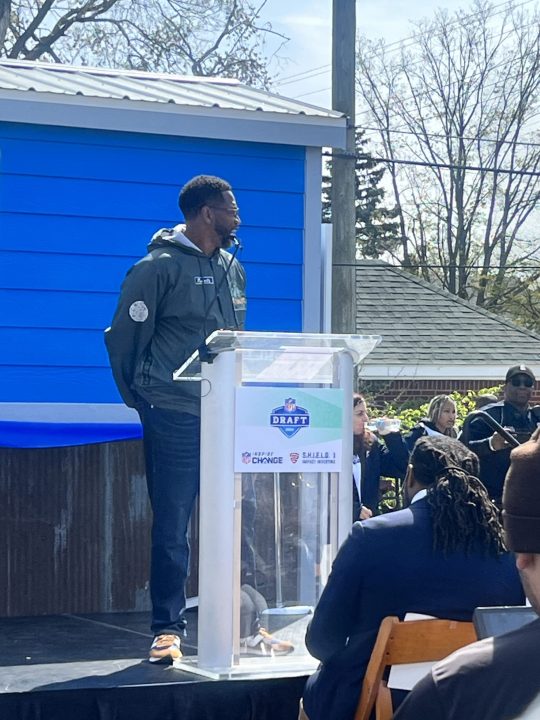
PHOTO: Travis Peters, Green Boots Community Horticulture Gardens and Marketplace
“My mission was to sustain myself, my family, and my community through urban agriculture without leaving our veterans out of the picture,” said Peters. “This place is a multifaceted space where we focus on urban agriculture basic training for our veterans and community along with horticulture therapy and protocols to help bridge the wellness gap.”
“The GroShed will allow us to produce food at a higher rate, a faster and a more economical rate” Peters said. “This space has no city municipalities connection whatsoever. We run on solar power and rainwater, I rely on nature and just what the earth gives us.”
Standing alongside community members and local media were NFL Commissioner Roger Goodell, United States Secretary of Agriculture Tom Vilsack, Senator Debbie Stabenow, New Orleans Saints Linebacker Demario Davis, NFL Cornerback Josh Norman, and NFL Legend Alex Lewis.
���Travis is an extraordinary man and I’m proud to be here on behalf of the NFL,” said Goodell. “I’m also inspired by our players. There are two players here that have really led the way. Damario Davis and Josh Norman. For the last 4 or 5 years I’ve heard about this concept and their desire to make this happen and they have worked to make this happen. It has been their undying support to bring this into fruition not just here in Detroit but also in Buffalo. These men are not just great professional athletes, they are stand up men.”
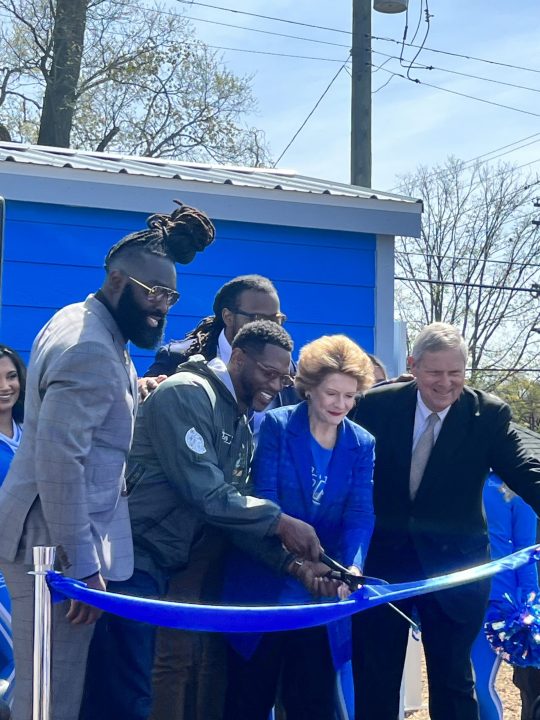
PHOTO: New Orleans Saints Linebacker Demario Davis, Travis Peters, NFL Cornerback Josh Norman, Senator Debbie Stabenow, United States Secretary of Agriculture Tom Vilsack.
This event is part of the NFL’s Inspire Change social justice initiative. Inspire
Inspire Change is designed to reduce barriers to opportunity, especially in communities of color, demonstrating the collective efforts of the NFL family—current and former players, teams, owners, and the league office—to foster positive change. The initiative operates at all levels within the league, with a mission to showcase their commitment to social justice and community improvement.
This GroShed initiative all started when Davis took a trip to Flint, MI a few years ago and realized there was a need for clean water. At the time he witnessed truckloads of water bottles being dispersed throughout the city, but he had an epiphany regarding his charity work, “What’s going on with the water system? That’s when we moved from doing just the charity work to finding sustainable solutions in the community.”
“This is a continuation of our work that we’re doing in other cities,” said Davis. “We are committed to bringing sustainable solutions to communities that have traditionally been marginalized. This work touches me personally. It brings our hearts joy.”
The NFL is collaborating with the White House on the “Challenge to End Hunger and Build Healthy Communities” initiative, highlighting this effort at the event.
Amidst the backdrop of steel and concrete, a transformation is quietly taking root—a healthy mindset. Spearheaded by Peter and powered by the enduring strength of the local Black community, this initiative isn’t merely about planting vegetables; it’s a reclaiming of urban spaces, turning them from symbols of decay into beacons of hope and growth. These community gardens are not just places to grow food; they are sanctuaries of empowerment, where residents, burdened by economic hardships and societal neglect, find a powerful form of expression and control over their lives and environment.
Peter’s movement is leveraging a rich yet underrecognized legacy of Black horticulture expertise, challenging the stereotype that urban communities lack the green thumbs or know-how. Each garden plot and GroShed serves as a testament to resilience and innovation, with every plant sown echoing the community’s deep-rooted connection to the land and their ancestors wisdom. This isn’t just about horticulture; it’s about cultural heritage, community, a bridge connecting past generations who tilled the soil for sustenance to a modern movement for food sovereignty and social justice.
“I started a number of years ago putting in place opportunities and extra support where veterans can go into farming,” said Senator Debbie Stabenow and chair of the agriculture, nutrition and forestry committee in Washington D.C. “We now have veteran organizations and veteran farmers around the country with the largest group in Michigan.”
Absolutely, agriculture transcends the rural boundaries we often confine it to; it’s very much a vibrant part of urban landscapes as well. Urban agriculture is about more than just growing food; it’s about building community, fostering sustainability, and ensuring access to healthy, affordable meals. Echoing this sentiment, Senator Debbie Stabenow said, “This is about providing healthy food in a sustainable way right here in our urban communities.”
This movement reshapes the concept of what it means to be a community. It’s a collective effort where city dwellers reconnect with their food sources and with each other, breaking down the isolation that urban environments can sometimes foster. Urban agriculture initiatives make it possible for fresh produce to travel just a few yards from soil to table, drastically reducing food miles and providing a stark contrast to the impersonal nature of mass food production.
Moreover, these initiatives are a testament to the adaptability and ingenuity of urban communities. Each space cultivated is a step towards a more sustainable urban existence, proving that the heart of agriculture isn’t found solely in wide-open spaces but wherever there are people willing to plant the seeds of change.
“The Greenboots community displays the real work,” Davis said. “You guys are the heroes and deserve the brightest light to be on you all. They are on the ground doing the work, it is people that are in the trenches that really keep the game going. So, thank you for your work.”
#Draft Day Spotlight: Beyond the Field#the NFL and Detroit Embraces Urban Agriculture#Detroit#Detroit Gardens#Detroit Urban Ag#Grosheds#Greenboots#Detroit Greening#Challenge to End Hunger and Build Healthy Communities#End Hunger#End Childhood Hunger in America#End Hunger Initiative#Flint Michigan#Flint Water Crisis#GroShed initiative#Lil Miss Flint
3 notes
·
View notes
Text
#video clip#video#new video#videography#motion ninety#stock video#getty images#istock#nature#woods#forest#environment#trees#scenic#scenery#global warming#climate#climate crisis#water#lake#swamp#marsh#park#state park#U.S.#NY#upstate#United States#America#New York
0 notes
Text
Love her energy 💗💗💗
#chop wood carry water#jessica craven#hearwhatshesaid#wearethemajority#use your voice#women's rights#stand up and fight#i dissent#use you power#personal power#superpowers#voter turnout#vote like your life depends on it#voter participation#american democracy#womens rights#voter registration#be strong#use your power#pay attention#wake up america#wake up call#existential crisis#not a drill#vote blue to save america#community#personal interactions#in person#face to face#speakup
0 notes
Text
Racism is alive and well in America
This Juneteenth as we celebrate and reflect on the progress we've made and look to what we can do to improve equal rights for black folks I want to bring attention to an issue far too closet to my heart- environmental racism.
I had a friend who died, far too young. It's been many years so newer tumblr users won't know him. His name was james and he was a popular tumblr user when he was alive @kumagawa . I idolized him like an older brother, and still do. He lived in Flint, Michigan. He was around 27 when he died. He was a healthy man, other than the fact he lived with dirty water in Flint, Michigan.
I'll never fucking forgive the US government for killing my friend, my brother. Why did James die? Because Flint, Michigan is 56% Black. Because it would be expensive to fix the lead pipes that gave my friend lead poisoning and killed him.
As of April 24,2024 the city of Flint, Michigan still hasn't replaced all the lead pipes that are poisoning the people living there.
https://www.aclumich.org/en/press-releases/residents-still-waiting-city-flint-replace-all-lead-pipes-10-year-anniversary-water
If you can help, give money to Mari Copeny's go fund me.
Mari Copeny, better known as Little miss Flint, is now 16 years old and over the past few years has raised nearly a million dollars for her community.
She has a website to links for other ways to support the community
Please reblog this post if you can't give any money... It would mean the world to me if I could use my friend's memory to help promote environmental racism and the issues still facing his community today.
9K notes
·
View notes
Text
By Bernie Sanders | July 13, 2024
I will do all that I can to see that President Biden is re-elected. Why? Despite my disagreements with him on particular issues, he has been the most effective president in the modern history of our country and is the strongest candidate to defeat Donald Trump — a demagogue and pathological liar. It’s time to learn a lesson from the progressive and centrist forces in France who, despite profound political differences, came together this week to soundly defeat right-wing extremism.
I strongly disagree with Mr. Biden on the question of U.S. support for Israel’s horrific war against the Palestinian people. The United States should not provide Benjamin Netanyahu’s right-wing extremist government with another nickel as it continues to create one of the worst humanitarian disasters in modern history.
I strongly disagree with the president’s belief that the Affordable Care Act, as useful as it has been, will ever address America’s health care crisis. Our health care system is broken, dysfunctional and wildly expensive and needs to be replaced with a “Medicare for all” single-payer system. Health care is a human right.
And those are not my only disagreements with Mr. Biden.
But for over two weeks now, the corporate media has obsessively focused on the June presidential debate and the cognitive capabilities of a man who has, perhaps, the most difficult and stressful job in the world. The media has frantically searched for every living human being who no longer supports the president or any neurologist who wants to appear on TV. Unfortunately, too many Democrats have joined that circular firing squad.
Yes. I know: Mr. Biden is old, is prone to gaffes, walks stiffly and had a disastrous debate with Mr. Trump. But this I also know: A presidential election is not an entertainment contest. It does not begin or end with a 90-minute debate.
Enough! Mr. Biden may not be the ideal candidate, but he will be the candidate and should be the candidate. And with an effective campaign taht speaks to the needs of working families, he will not only defeat Mr. Trump but beat him badly. It’s time for Democrats to stop the bickering and nit-picking.
I understand that some Democrats get nervous about having to explain the president’s gaffes and misspeaking names. But unlike the Republicans, they do not have to explain away a candidate who now has 34 felony convictions and faces charges that could lead to dozens of additional convictions, who has been hit with a $5 million judgment after he was found liable in a sexual abuse case, who has been involved in more than 4,000 lawsuits, who has repeatedly gone bankrupt and who has told thousands of documented lies and falsehoods.
Supporters of Mr. Biden can speak proudly about a good and decent Democratic president with a record of real accomplishment. The Biden administration, as a result of the American Rescue Plan, helped rebuild the economy during the pandemic far faster than economists thought possible. At a time when people were terrified about the future, the president and those of us who supported him in Congress put Americans back to work, provided cash benefits to desperate parents and protected small businesses, hospitals, schools and child care centers.
After decades of talk about our crumbling roads, bridges and water systems, we put more money into rebuilding America’s infrastructure than ever before — which is projected to create millions of well-paying jobs. And we did not stop there. We made the largest-ever investment in climate action to save the planet. We canceled student debt for nearly five million financially strapped Americans. We cut prices for insulin and asthma inhalers, capped out-of-pocket costs for prescription drugs and got free vaccines to the American people. We battled to defend women’s rights in the face of moves by Trump-appointed jurists to roll back reproductive freedom and deny women the right to control their own bodies.
So, yes, Mr. Biden has a record to run on. A strong record. But he and his supporters should never suggest that what’s been accomplished is sufficient. To win the election, the president must do more than just defend his excellent record. He needs to propose and fight for a bold agenda that speaks to the needs of the vast majority of our people — the working families of this country, the people who have been left behind for far too long.
At a time when the billionaires have never had it so good and when the United States is experiencing virtually unprecedented income and wealth inequality, over 60 percent of Americans live paycheck to paycheck, real weekly wages for the average worker have not risen in over 50 years, 25 percent of seniors live each year on $15,000 or less, we have a higher rate of childhood poverty than almost any other major country, and housing is becoming more and more unaffordable — among other crises.
This is the wealthiest country in the history of the world. We can do better. We must do better. Joe Biden knows that. Donald Trump does not. Joe Biden wants to tax the rich so that we can fund the needs of working families, the elderly, the children, the sick and the poor. Donald Trump wants to cut taxes for the billionaire class. Joe Biden wants to expand Social Security benefits. Donald Trump and his friends want to weaken Social Security. Joe Biden wants to make it easier for workers to form unions and collectively bargain for better wages and benefits. Donald Trump wants to let multinational corporations get away with exploiting workers and ripping off consumers. Joe Biden respects democracy. Donald Trump attacks it.
This election offers a stark choice on issue after issue. If Mr. Biden and his supporters focus on these issues — and refuse to be divided and distracted — the president will rally working families to his side in the industrial Midwest swing states and elsewhere and win the November election. And let me say this as emphatically as I can: For the sake of our kids and future generations, he must win.
Bernie Sanders is the senior senator from Vermont.
3K notes
·
View notes
Text

watercolor map of America in a book
#artists on tumblr#artwork#water color#maps#geography#america#fantasy map#adhd artists and local crisis
0 notes
Text
the ceasefire was supposed to begin about an hour ago as of writing, but the israeli army has admitted to its continued bombing of the gaza strip, violating its own agreement. netanyahu claims he cannot honor the ceasefire until hamas hands over a list of names of settler hostages to be handed over first; hamas blames this on technical issues.
my friend and gazan journalist siraj abudayeh @siraj2024 (#219) tells me there is shooting along the border between gaza and '48, both in the north and south of gaza. he is also, despite everything, cautiously optimistic that things will settle themselves out soon and the ceasefire can properly begin. here's the message he sent me on the matter (before we got the notification that the ceasefire had been violated):
The ceasefire entered into force in the Gaza Strip after agreements were reached between the Palestinian factions and the Israeli occupation, which gave an opportunity to calm the military situation that had led to the death and injury of thousands of civilians and the widespread destruction of infrastructure. But despite this temporary cessation of fighting, the humanitarian need in Gaza remains dire and persistent. The temporary ceasefire came after months of military escalation, during which civilian areas in Gaza were the target of air and artillery attacks, resulting in the destruction of homes, hospitals and schools. Although the fighting has stopped, Siraj's family still needs significant humanitarian support. Siraj's family is still displaced and suffers from a severe shortage of basic materials such as food, medicine, and clean water. The next phase requires support to mitigate the ongoing humanitarian crisis.
there's still a strong chance that aid will be let into gaza in the coming days, and the process of rebuilding gaza will begin - whether under israeli fire or not. after gaza has has everything stolen. i ask that whoever sees this reblogs or donates to siraj's campaign. he has lost friends, family and colleagues, gofundme has deleted his survival campaign twice, and he's lost his livelihood over the course of this genocide, funded by america. we don't know what is coming next, but we know that these facts cannot change. what matters most right now is getting aid to people who need them.
#og#palestine#palestine resources#gaza#free palestine#free gaza#gaza strip#save palestine#i stand with palestine#all eyes on palestine#palestine fundraiser#gofundme#chuffed#verified fundraisers#go fund me#ceasefire#news#al jazeera
545 notes
·
View notes
Text
Genuinely I think you guys should look into Solarpunk. Like, it’s a dark day in America, and everyone is feeling hopeless. And unfortunately America is a country that literally doesn’t mind its own business and has to be involved with the rest of the world. Mostly in a bad way. But.
I think you need to check out Solarpunk. Yes it’s literary as it’s speculative fiction. Yes it’s an aesthetic. But it’s also a real life movement. It’s activism against the climate crisis. To reverse the effects of our planet. It’s activism for human rights. The right to housing, the right to food, the right to water. Activism for education, health care, child care. To have the choice to have an abortion. It is about banding together with your community, with your fellow humans.
Solarpunk is about feeling rage about everything that is wrong with the world and using it to help fix it. It is about feeling hope that the actions you do will change things for the better, no matter how slow. Organization. Protests. Even something like calling, emailing, writing a letter to the people in your government. Your mayor, your county representative, your state representative and so on. It is about choosing kindness to help people in need. To help people who were once in cults and are taught to be afraid of “outsiders.” To help people when they realize that they were wrong and help them be able to grow. To share food with others, offer a friend a place to stay, join community events.
It is okay to rage. To cry. To scream and feel like the world is burning to the ground. Let yourself feel those emotions. And look at Solarpunk. Use your emotions as fuel to make things better. For yourself and others. To make things a bit kinder. For yourself and others.
#solarpunk#us politics#2024 presidential election#presidential election#usa president#usa election#it can be so easy to be mean#to say I told you so#to mock#but we all know that in the coming days that people are going to be surprised#by how wrong they were for who they voted for#and they too need help and kindness when they realize that they were wrong#and that they want to grow to become better
577 notes
·
View notes
Text
Flint Plus 10
Today marks a full decade since the residents of Flint, Michigan last had clean drinking water. The city's pipes were supposed to be fully repaired four years ago and they still aren't anywhere close.
Meanwhile, a portion of the bottled water that was meant for the residents was found unopened, probably leaching BPA at this point.
People like Rick Snyder who were primarily responsible will never get their day in court due to clashing egos over how to prosecute them.
If Flint, Jackson and East Palestine are only the tip of the iceberg on what's ahead, then America is in for a really painstaking collapse.
TEN FUCKING YEARS. I'm exhausted.
#flint water crisis#america is a failed state#america is a shithole country#wtf is this bullshit#america is the bad place#empire in decline#late stage capitalism#end stage capitalism
0 notes
Text
Dandelion News - January 1-7
Like these weekly compilations? Tip me at $kaybarr1735 or check out my Dandelion Doodles!
1. Homes built with clay, grass, plastic and glass: How a Caribbean island is shying away from concrete

“[… Clay] traps moisture which then evaporates and pulls heat from the surface as it goes. […] The roof is covered in old recycled advertising banners and piece of a water tank, the other half of which is used to house some of Rahaman-Noronha's fish [… and] multi-coloured glass bottles inset into walls provide an avenue for streams of light and colour.”
2. To Combat Phoenix’s Extreme Heat, a New Program Provides Sustainable Shade
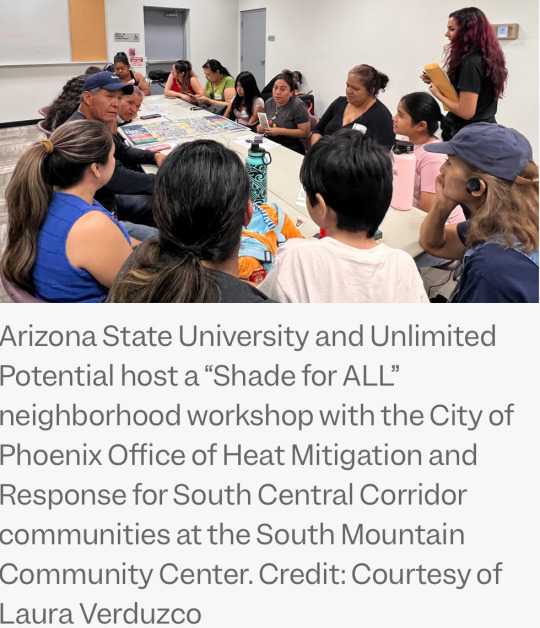
“The neighborhood workshops allow residents to get a shade plan tailored to their community’s needs and identify the locations where officials can plant trees. Meanwhile, the workforce-development side of the program creates the jobs needed to keep the trees alive for generations[….]”
3. Conservation corridors provide hope for Latin America’s felines

“[… S]cience has shown that to maintain healthy populations there needs to be connection between individuals. [… A] protected area that is close to another has more species and more potential for their survival.”
4. Social program cuts tuberculosis cases among Brazil's poorest by more than half
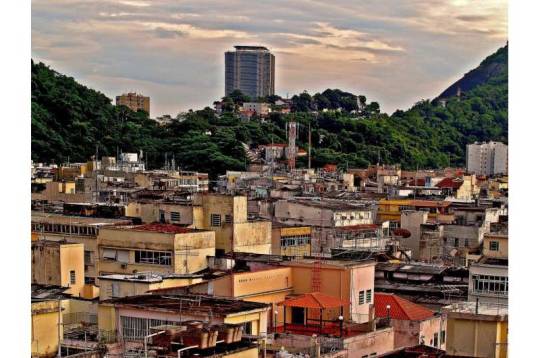
“The decrease [“in TB cases and deaths”] was over 50% in extremely poor people and more than 60% among the Indigenous populations. […] "We know that the program improves access to food [… and healthcare…] and strengthens people's immune defenses as a result.””
5. Geothermal has vast potential to meet the world’s power needs
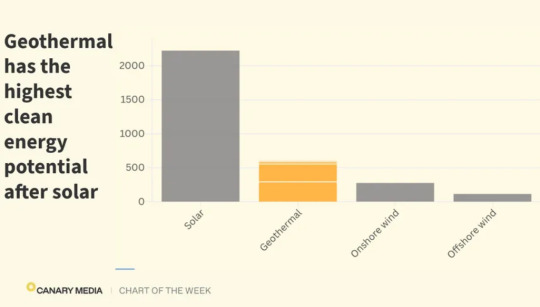
“New geothermal systems could technically provide as much as 600 terawatts of carbon-free power capacity by 2050[…. C]ountries could cost-effectively deploy over 800 GW of geothermal power capacity using technology that’s in development today[….]”
6. New D.C. Catholic archbishop is pro-LGBTQ+ and anti-Trump
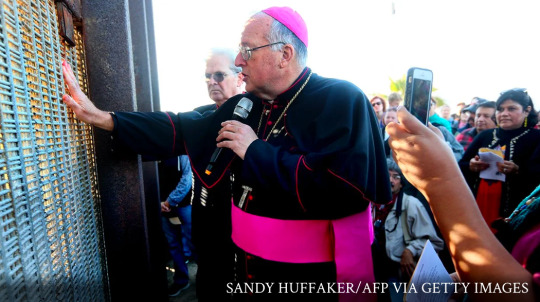
“In 2018, he objected to the blaming of gay priests for the clergy sexual abuse crisis, “saying that such abuse was a matter of power, not sexual orientation[….]” “We must disrupt those who portray refugees as enemies [… and] seek to rob our medical care, especially from the poor.””
7. Chesapeake Bay Will Gain New Wildlife Refuge
“The Chesapeake Bay area will have a new wildlife refuge for the first time in a quarter century. […] “This new refuge offers an opportunity to halt and even reverse biodiversity loss in this important place, and in a way that fully integrates and respects the leadership and rights of Indigenous peoples and local communities.””
8. Inside Svalbard seed vault’s critical mission to stop our favourite fruit and veg from going extinct

“[… T]he world’s largest secure seed storage […] sits proudly in a massive former coal mine[….] Right now, there are over 1,331,458 samples of 6,297 crop species. […] “During 2024, 61 seed genebanks deposited 64,331 seed samples, including 21 from institutes that deposited seeds for the first time this year[….]””
9. Medical debt will be erased from credit reports for all Americans under new federal rule

“The rule will affect more than 15 million Americans, raising their credit scores by an estimated average of 20 points. [… S]tates and localities have already utilized American Rescue Plan (ARP) funds to support the elimination of over $1 billion in medical debt for more than 700,000 Americans[….]”
10. 'Forgotten' water harvesting system transforms 'barren wasteland' into thriving farmland
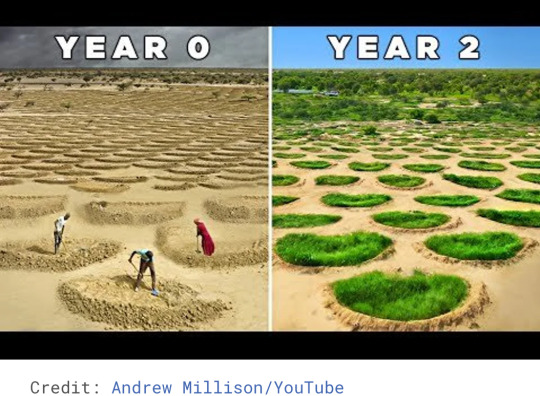
“"The process started with the community-based participatory planning[….]” 10% to 15% of the water will actually soak into the ground to replenish the water table, creating a more sustainable agricultural process.”
December 22-28 news here | (all credit for images and written material can be found at the source linked; I don’t claim credit for anything but curating.)
#hopepunk#good news#recycling#upcycling#climate change#climate action#trees#habitat restoration#habitat#big cats#cats#latin america#brazil#tuberculosis#poverty#geothermal#clean energy#renewableenergy#catholic#lgbt+#lgbt#lgbtq#religion#christianity#wildlife refuge#wildlife#seed saving#seed bank#medical debt#anti capitalism
309 notes
·
View notes
Text
America Is Using Up Its Groundwater Like There’s No Tomorrow
Plant genetics and also more efficient irrigation and better land management can help, but “The loss of water is going to outpace the gain of technology.”
#usa#america#groundwater#water#capitalism#environmentalism#ecosystem#global warming#climate change#climate crisis#climate action#climate emergency#climate and environment#climate catastrophe#climate collapse#climate chaos#united states#unitedstateofamerica#unitedsnakes#united states of america#unitedstatesofhypocrisy#class war#classwar#biden administration#joe biden#biden crime family#biden will destroy america#hunter biden#ecology#co2 emissions
2 notes
·
View notes
Text
Excerpt from this Rolling Stone story:
A series of powerful wildfires has turned large swaths of Los Angeles into smoldering ruins. As first responders attempt to control the blazes, heavy winds are quite literally fanning the flames — to the point that the fires have now been ravaging the city for days. There is a clear link between climate change and the severity of recent wildfires. Climate-denying conservatives are instead blaming the devastation on California’s “woke” politics.
“DEI means people DIE,” Elon Musk wrote Wednesday on X in response to a video of Los Angeles Fire Chief Kristin Crowley discussing how she wants to diversify the department.
Musk also responded “True” to a post from conspiracy theorist Alex Jones about the fires being “part of a larger globalist plot to wage economic warfare and deindustrialize the United States before triggering total collapse” — and then later deleted his response.
Musk has not deleted his promotion of several other posts blaming the destruction on diversity initiatives. “Los Angeles deliberately set out to exclude white men from becoming firefighters, and now they don’t have enough firefighters to prevent their city from burning to the ground,” wrote right-wing commentator Matt Walsh in one post endorsed by Musk. “DEI is a cancer that destroys everything it touches.”
Former Fox News host Megyn Kelly accused Fire Chief Crowley and Mayor Karen Bass of prioritizing “DEI” over the city’s fire management capabilities. “In recent years, L.A.’s fire chief has made not filling the fire hydrants top priority, but diversity,” Kelly raged on Wednesday. “Who gives a shit if the fire chief is gay. I’m sorry, but who gives a flying fig about who she likes to sleep with, can you fight the fucking fires, madam? That’s the relevant question.”
There’s no evidence that the fire department’s push for diversity has any affect on its ability to fight fires. It’s also not true that Bass cut the department’s budget by $23 million, another claim that has spread throughout right-wing media.
Conservatives have also been pushing the false idea California Gov. Gavin Newsom’s water policies have prevented the city’s ability to fight the fires. Trump has long been bashing Newsom over the policies, and has blamed him directly for the fires this week. “One of the best and most beautiful parts of the United States of America is burning down to the ground,” the president-elect wrote today. “It’s ashes, and Gavin Newscum should resign. This is all his fault!!!”
On Fox News, host Jesse Watters decided to blame Native Americans for the devastation, as well, claiming that Newsom has “been tearing down dams” because “Indians wanted some of the river back so they could catch salmon. Gavin didn’t just knock down one dam for the Indians, he knocked down all four.”
“And these dams were a go-to source for firefighters to pull water from to fight fires up north. Gavin’s literally tearing down Western civilization for fish and Indians,” Watters said, repeating the claim in another segment aired on Wednesday.
The fires currently destroying Los Angeles — as well as the fires that have increasingly been devastating the West Coast in recent years — are the result of hot, dry conditions caused by climate change. These conditions are inevitably going to lead to natural disasters that are going to overwhelm any infrastructure, regardless of the race and gender of the people running it. It’s an inconvenient truth for conservatives, who would rather point their fingers at minorities than acknowledge the reality of the climate crisis.
207 notes
·
View notes